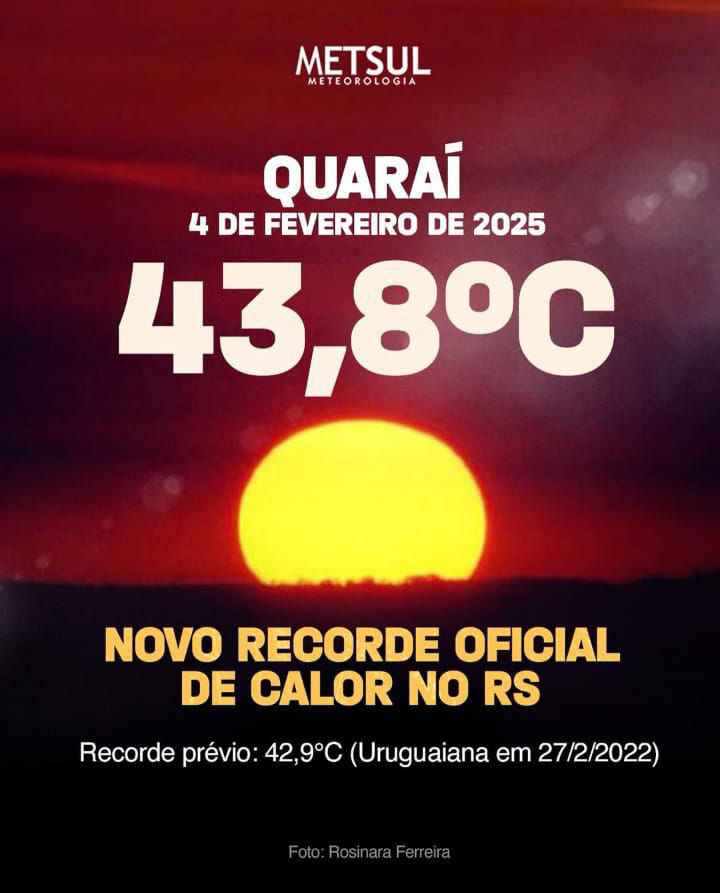English Version
Recently, in Brazil, a political movement was dedicated to denying science and one of the points under question was precisely global warming. Many argued that we have always had heat waves and that this happens from time to time.
Yes, we do have years that are hotter than others. However, what is happening now is that the hottest days are happening more frequently, as are the intensity of the rains and floods.

Talking to a family member who was affected by the last major flood in the city of Eldorado, near Porto Alegre, he told me that the house where he currently lives had never seen the Guaíba River flood. In the previous house, the floods had reached four times in 30 years, all of these times recently, in the last ten years.
The same thing happens with regard to temperatures. Occasionally, we had heat of 40ºC at this time of year in Porto Alegre, the metropolitan region and, mainly, on the border with Argentina and Uruguay. Statistically, global temperatures have risen by 1.54ºC compared to the last century, according to the Global State of the Climate 2024, published by the World Meteorological Organization (WMO).
In Brazil, the hottest year recorded by the National Institute of Meteorology was last year, surpassing the previous year, which also held a record. The five highest annual averages were recorded between 2016 and 2024.
Individually, the heat records are also all recent. The highest temperature ever recorded in Brazil was 44.8ºC in the city of Araçuaí, in Minas Gerais, on November 19, 2023.
In second place, with 44.7ºC is the city of Bom Jesus, in Piauí, recorded on November 21, 2005. On October 19, 2023, Aragarças, in Goiás, recorded 44.3ºC, followed by Cuiabá, in Mato Grosso, which recorded 44.2ºC.
The capital of Mato Grosso had already recorded a record on September 30, 2020, when thermometers marked exactly 44ºC. Now, the city of Quaraí, in Rio Grande do Sul, on the western border, recorded 43.8ºC on February 4 of this year.
Português (Brasil)
Recentemente, no Brasil, um movimento político se dedicou ao negacionismo da Ciência e um dos pontos sob questionamento era justamente o aquecimento global. Muitos argumentavam que sempre tivemos ondas de calor e que isso se repete de tempos em tempos.
Sim, eventualmente, temos anos mais quentes do que outros. No entanto, o que acontece, atualmente, é que os dias mais quentes vem se repetindo com mais frequência, assim como a intensidade das chuvas e das enchentes.
Conversando com um familiar que foi atingido pela última grande enchente na cidade de Eldorado, próximo a Porto Alegre, ele me contou que a casa onde ele mora atualmente nunca havia chegado a cheia do rio Guaíba. Na casa anterior, em 30 anos, a enchente chegou quatro vezes, sendo todas estas vezes, recentemente, nos últimos dez anos.
A mesma coisa se repete com relação às temperaturas. Eventualmente, tínhamos calor de 40ºC nesta época do ano em Porto Alegre, região metropolitana e, principalmente, na fronteira com a Argentina e o Uruguai.
Estatisticamente, a temperatura global subiu 1,54ºC em relação ao século passado de acordo com o Estado Global do Clima 2024, publicada pela Organização Meteorológica Mundial (OMM).
No Brasil, o ano mais quente registrado pelo Instituto Nacional de Meteorologia foi justamente o ano passado, superando o ano anterior, que também havia registro recorde. As cinco maiores médias anuais foram registradas entre 2016 e 2024.
Individualmente, os recordes de calor também são todos recentes. A maior temperatura já registrada no Brasil foi de 44,8ºC na cidade de Araçuaí, em Minas Gerais, no dia 19 de novembro de 2023.
Em segundo lugar, com 44,7ºC está a cidade de Bom Jesus, no Piauí, registrado em 21 de novembro de 2005. No dia 19 de outubro de 2023, Aragarças, em Goiás, registrou 44,3ºC, seguido por Cuiabá, no Mato Grosso, que registrou 44,2ºC.
A capital mato-grossense já havia registrado um recorde em 30 de setembro de 2020, quando os termômetros marcaram exatos 44ºC. Agora, a cidade gaúcha de Quaraí, na fronteira oeste, registrou 43,8ºC no dia 4 de fevereiro deste ano.
